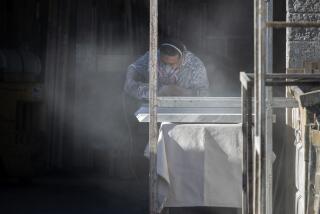Dash of Exploitation With the Broccoli : The health of California field workers demands bill that bans hand-weeding
- Share via
With the recent publication of his book, “The Death of Common Sense,” Philip Howard quickly became the talk of Washington bureaucracy-tamers. His appealing premise is that our laws and regulations have become far too detailed and prescriptive; only by resisting the urge to legislate precise solutions to every problem will this nation’s economy and social structure regain their old robustness. Goodwill, agreement on shared goals and a fair measure of flexibility, Howard writes, would allow common sense to triumph over burdensome laws.
So what are we to make of SB 587? On the surface, this limited bill seems the sort of over-regulation against which Howard justly rails. Indeed, in a world where employers and their employees share goals, it would be unnecessary. But the world of farm labor cries out for approval of this legislation when the Senate takes it up once more in the coming months.
SB 587, authored by Sen. Hilda Solis (D-El Monte), would close a loophole in a 20-year-old ban on use of the short-handled hoe in California fields. In the early 1970s, physicians who studied the practice found that use of hoes with handles shorter than four feet required workers to bend for long periods, causing crippling back injuries. Farmers said they preferred the shorter hoe because field hands worked faster with it and were less likely to damage young plants when they were bending near the ground.
After unsuccessful efforts were made to legislate an end to the short-handled hoe, a 1975 state Supreme Court ruling paved the way for state officials to declare the tool unsafe and outlaw its widespread use.
Now, however, some growers are ordering their field workers to weed certain crops by hand, a practice that is not outlawed. Mounting reports of this practice in Ventura County lettuce and broccoli fields spurred the Solis legislation, which would bar growers from requiring workers to weed without a hoe.
Many legislators will regard SB 587 as over-regulation in the extreme. Those who do, whether because they see hand-weeding as a necessity or this bill as egregious micro-management, should recall what the state labor code has to say: Sections 6400 and 6403, among others, specify that all employers have a general duty to maintain a safe and healthful workplace.
Surely agricultural labor practices that consistently cause injury are, on their face, incompatible with those provisions. Yet growers have successfully contended for years that these labor code sections are unenforceable because they are vague. This bill should not have been necessary, but its passage is now clearly essential.
More to Read
Sign up for Essential California
The most important California stories and recommendations in your inbox every morning.
You may occasionally receive promotional content from the Los Angeles Times.










